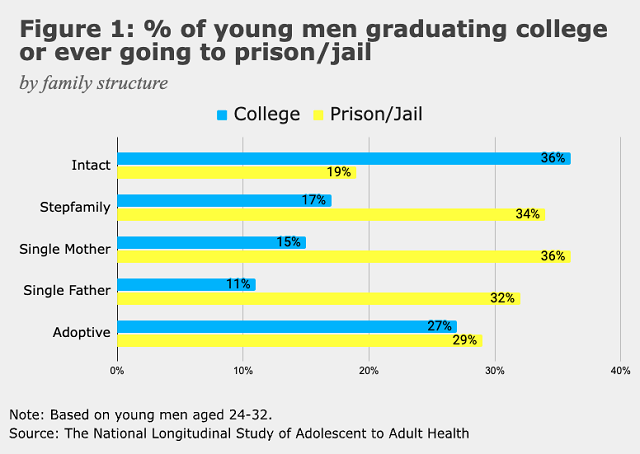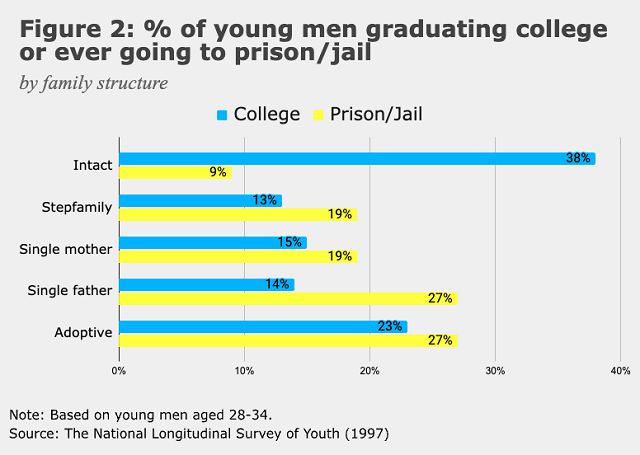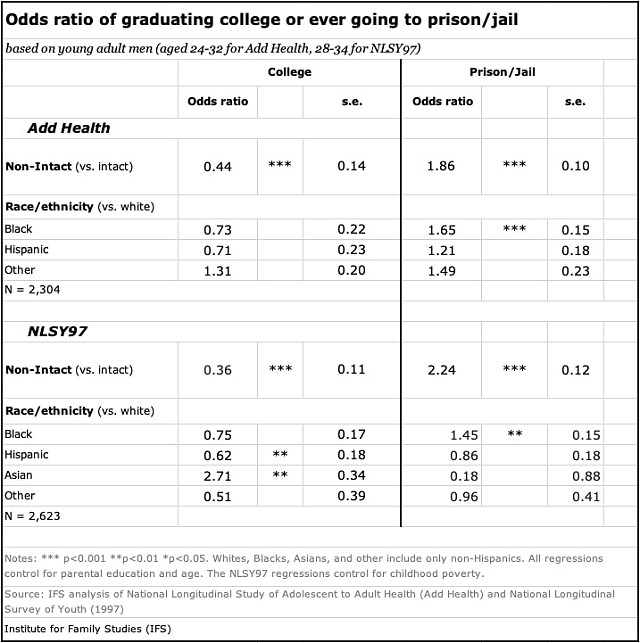Highlights
- What we see for young men today is a family-to-prison-or-college pipeline that is more likely to deliver boys from intact families towards college graduation and boys from non-intact families towards prison or jail. Post This
- Young men from a range of different non-intact family forms are more likely to end up in prison than graduate from college by their late-20s. Post This
- Young men raised by their two married, biological parents are almost 20 percentage points more likely to graduate college than end up in prison/jail. Post This
- Family structure, particularly the presence of a father in the home, should not be overlooked when trying to remedy the plight of young men. Post This
A growing minority of young men are floundering. “Failure to launch” is a description that’s all too common. Consider working a stable job—a decent proxy for whether someone has their life together. For young men (ages 16-24), labor force participation rates are dropping. In 1980, the share of young men who were looking for or had a job was 84%, but now it has dropped to 60 percent. Likewise, male enrollment in college is declining, so quickly, in fact, that only about 4-in-10 college students are now male. Finally, young men are 3-4 times more likely to spend any time in jail or prison compared to young women by the time they turn about 30, according to the National Longitudinal Survey of Youth (1997). The bottom line is that on many fronts, too many young men are not successfully transitioning into adulthood today.
These negative male trends have been addressed by books like Boys Adrift by Leonard Sax or Of Boys and Men by Richard Reeves. They have even caught the eye of major figures on the left like Melinda Gates, someone known for championing women’s issues, who is pledging $20 million to Reeves’ American Institute for Boys and Men to address this male malaise.
Public intellectuals like Reeves, Scott Galloway, and Jonathan Haidt have blamed the falling fortunes of young men on shifts in our economy, schools that don’t do a good job of serving our boys, or technology that distracts adolescent males from real life. But they have largely overlooked an even more fundamental factor in a boy’s life: whether or not he grew up in an intact, married home with his father.
This research brief remedies this gap by looking at young men’s likelihood of graduating college or ending up in prison or jail in terms of their family structure growing up. The most striking finding is that young men from non-intact families are more likely to land in prison or jail than they are to graduate from college, whereas young men raised by their married fathers are significantly more likely to graduate from college than spend any time in prison/jail.
Previous Research
Social scientists generally find that children raised by their married, biological parents do better than those from non-intact families. This relationship is found independent of race, gender, or income and applies to numerous outcomes (physical health, mental health, educational attainment, etc.). But why do we find this relationship?
Part of the story is about what social scientists call “selection effects”—that is, married people are, on average, richer, more educated, more religious, and even healthier. And these factors help to account for some of the outcomes associated with marriage. But we also believe the relationship between family structure and life outcomes is causal. When it comes to males in particular, stably married parents typically offer boys:
- More income and other socioeconomic resources that give them an advantage in school and college. In particular, boys are more likely to have access to their father’s income if he is married to their mother;
- More attention, affection, and constructive discipline, particularly from their fathers, that minimize their risk of engaging in delinquent or antisocial activities that would land them in prison; and,
- Two parents who know them, love them, and have a biological tie to them that increases their willingness to invest in them and reduces their risk of neglecting or abusing them, as sociologists Sara McLanahan and Gary Sandefur noted in their book, Growing Up With a Single Parent: What Hurts, What Helps. By contrast, boys raised outside of intact, married homes are more likely to be exposed to unrelated adults, especially males, who pose a greater risk of being neglectful or even abusive to them, as Brad Wilcox noted in his book, Get Married: Why Americans Must Defy the Elites, Forge Strong Families, and Save Civilization.
Family Structure and Young Male Outcomes
This brief adds to the literature on family structure and the outcomes of boys and men by focusing on two key outcomes for young men: obtaining a college degree and going to prison or jail. Recent research by Melissa Kearney, for instance, indicates that young men from married households are more likely to graduate college. And older research by Sara McLanahan and Cynthia Harper indicates that young men from such households are less likely to be incarcerated. But no research has analyzed family structure, college graduation, and incarceration all together for today’s young men with recent data.
Accordingly, we use data from two nationally representative surveys: the National Longitudinal Survey of Youth (1997) and the National Longitudinal Study of Adolescent to Adult Health (Add Health). The NLSY97 follows a sample of Americans born between 1980 and 1984, first interviewed in 1997. The Add Health follows 7th-12th graders first interviewed in the 1994-1995 school year. Both surveys comprise different waves that follow the respondents throughout their lives. To measure young males’ outcomes, we used Wave IV (2008) of Add Health and the 2013/2014 wave of NLSY97. Respondents were aged 24-32 and 28-34, respectively, in these surveys.
Figure 1 shows what percentage of men have either graduated college or gone to prison/jail, separated by family structure. Young men raised by their two married, biological parents—our measure of intact families for Add Health—are almost 20 percentage points more likely to graduate college than end up in prison/jail. Strikingly, this is the only group where graduating college is more likely than prison/jail. Meanwhile, the statistic flips for young men from non-intact families. All non-intact categories in this group are associated with young men being more likely to go to prison than graduate college in the Add Health survey.

Figure 2 shows similar results using NLSY97 data, with a more pronounced difference. Young men from intact, biological families are over three times as likely to graduate college than go to prison. And again, young men from a range of different non-intact family forms are more likely to end up in prison than graduate from college by their late-20s. Note: different-aged cohorts, sample size, survey methodology, and general noise explains the slight variations in the patterns across these two different datasets.

Using NLSY97 data, we found that, after controlling for basic demographic characteristics like race, mother’s education, and childhood poverty, being raised outside of an intact family doubles young men’s odds of going to prison/jail. The odds of graduating college are more than halved for young men raised outside of an intact family. We found similar results using the Add Health (see Table A in the Appendix).
The multivariate results suggest two noteworthy points:
- First, family structure is more strongly associated with incarceration and college graduation than race for young men across both datasets.
- Second, young men who grew up in non-intact family forms are more likely to go to prison than graduate college in both datasets.
In other words, what we see for young men today is a family-to-prison-or-college pipeline that is more likely to deliver young men from intact families towards college graduation and young men from non-intact families towards prison or jail.
Conclusion
Using two nationally representative surveys, Add Health and NLSY97, we find that boys from intact families are significantly more likely to graduate from college and avoid prison time. This relationship holds even compared to two-parent step-families—consistent with McLanahan & Sandefur’s findings in 1994. Additionally, family structure remains a strong predictor of these outcomes even controlling for factors like race, mother’s education, and childhood poverty. These findings are consistent with prior research and demonstrate the key point here: family structure, and particularly the presence of a father in the home, should not be overlooked when trying to remedy the plight of young men.
These associations are suggestive, but we do not claim to demonstrate causality. Family structure is endogenous to a number of life outcomes. Many unobserved covariates—such as income or personality differences—are correlated with family structure and simultaneously affect life outcomes. Nevertheless, these findings contribute to the existing evidence and warrant further attention from social science researchers.
In a world where young men are increasingly failing to thrive, it is encouraging to see new attention directed towards them. However, as the data show, family structure should not be discounted. We find that boys who grew up with both biological parents have better outcomes in two key measures—graduation and incarceration—furthering the case that two parents matter, including fathers, for America’s boys and men. Therefore, any effort to revive the falling fortunes of young men should put family at the forefront.
Brad Wilcox is the Future of Freedom Fellow at the Institute for Family Studies, and a professor and director of the National Marriage Project at the University of Virginia. Sam Herrin is a recent economics graduate from Georgia College & State University. Wendy Wang is director of research at the Institute for Family Studies. Jesse Smith is an Assistant Professor of Sociology at Benedictine College.
Appendix











